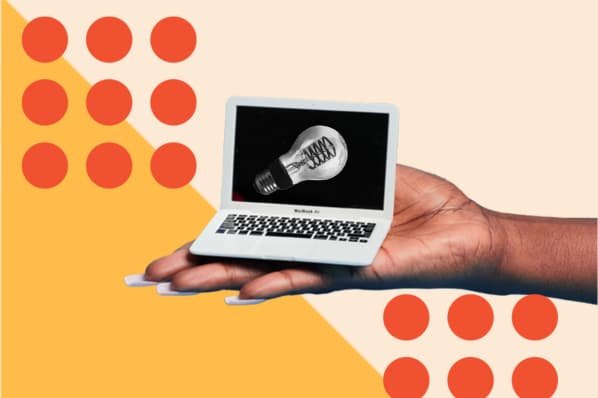It’s not a secret AI is driving the growth of the marketing industry. As a writer in the marketing industry, I’ve seen it myself.

AI can help with everything from thinking to creating content. But another marketing task where AI excels? Personalization.
I get a lot of personalized marketing, and it’s obvious when something uses surface-level personalization and when something is tailored to my specific interests and behaviors — and the latter always gets my attention.
If you’re interested in using AI personalization in your marketing to reach your customers, I’ve put together this guide to help you out.
Content
Why use AI to personalize marketing?
In my experience, The biggest reason to use AI to personalize your marketing is that it allows you to scale your personalization efforts.
Marketers are no strangers to using it marketing automation tools to personalize emails, generate leads or set up workflows. Automation tools are great for streamlining repetitive marketing tasks.
The difference in using AI for personalization of marketinghowever, it is AI is dynamic. AI can collect and interpret data, identify opportunities and adapt to the data presented.
This means that rather than being a tool to simplify personalization, AI can help you personalize your marketing on a deeper level.
Not only does personalization help increase sales, but 96% of sellers they also say that a personalized experience increases the chances of customers becoming repeat customers.
The Marketing Benefits of AI Personalization
If you’re like most marketers I know, you already have reliable marketing automation in place. But if you’re curious about taking your automation to the next level, consider adding AI personalization to the mix.
Here are just a few of the benefits, according to the marketers I spoke to.
Personalization at scale
According to HubSpot’s 2024 State of Marketing Report77% of marketers using generative AI say it helps them create more personalized content. On top of that, 56% of those same marketers say their AI-generated content performs the same or better than content created entirely by humans.
This shows that AI is not a replacement for your current personalization efforts, but a tool to help you augment them. When you provide the right queries and have a clear vision of what kind of data you’re looking for, AI can help you reach more customers in a personalized way.
neither one nor the other James Brooksmarketer and founder Journorobosays, “AI gives us the opportunity to scale unscalably.”
Brooks adds, “The key is to use this creatively, thoughtfully, and put in the effort up front. If you put in the effort on the front end and create a great, detailed questionnaire, it will serve you for months or years to come, every day, on autopilot.”
Lauren PetrulloCEO and founder of an award-winning digital marketing agency Mongoose Mediaadds to this sentiment: “The personalization you can leverage with AI allows the consumer or subscriber to feel like you’re talking to them one-on-one versus one-to-many,” she says.
Improved marketing automation
As I mentioned earlier, every marketer uses marketing automation to streamline their tasks. AI tools can enhance your current automations by making them more intelligent and data-driven.
For example, let’s say I have an automation that segments my target audience. AI can take this a step further by identifying patterns and predicting the behavior of those audiences.
This can help me make more informed marketing and business decisions.
Greater value for the customer
Finally, with greater personalization comes greater value for customers.
The more details you have about your target audience, the more tailored your marketing will be. This results in them getting more value than they would through generic marketing tactics.
AI Personalization Marketing Challenges
AI personalization tools are not without their drawbacks. Let’s break down a few challenges and how marketers can address them.
Crafting Prompts
The most common challenge I hear about when using AI – and have experienced myself – is incentivization.
The AI is smart, but it’s still learning. In fact, most tools take time and a lot of practice (i.e. receiving prompts) to adapt to your voice, tone, and requirements.
This can be a challenge when using AI for personalization. Brooks suggests being as specific as possible to generate better queries:
“Look at the Language Learning Model (LLM) as a person – a VERY intelligent person with knowledge, but a person nonetheless,” he says.
“He can’t read your mind. Ask very specific queries. Tell the LLM exactly what you want: how you want them to write, what you want the output to be, how you want things formatted, what you want and don’t want.”
Technical Knowledge
Another challenge marketers may encounter is a lack of technical knowledge.
Marketing personalization at scale requires a bit more technical expertise than using ChatGPT, for example.
You may need to understand APIs and better understand how AI works to create personalization workflows and automated exits.
“Fortunately, with the rise of ‘no-code’ tools, it’s never been easier to leverage APIs and automate your marketing,” says Brooks.
“I recommend checking out tools like Make.com and Zapier that connect natively with your favorite marketing tools and AI platforms like OpenAI. A bit of YouTube can also help in learning these things.”
Top 5 Use Cases for AI Marketing Personalization
1. Email marketing
Sending personalized emails is nothing new. We’ve all received a marketing email addressed to us or reminding us of an item we just looked at while shopping online.
But AI tools can help marketers thrive.
You can use AI to collect details about customers such as their birthday, hobbies, professional expertise and even passions. Then enter that information into LLM before sending marketing emails.
This allows you to send emails that really speak their language, suggests Brooks.
“You can do this in an automated way using a variety of tools without coding,” he says. “I personally use Bento for my emails. “It can make an API call for every email it sends, meaning you can send unique emails, per person, even if you’re effectively ‘Broadcasting’ thousands of people.”
2. Thought leadership
Yes, you can use AI to identify opportunities for thought leadership.
Let me explain.
While researching use cases for this article, I reached out to X to ask marketers for examples of how they are using AI for personalization.

This tweet is how I connected with Brooks, the founder of Journorobo.
He was notified of my tweet via his AI tool, which looks for requests from journalists (like the one I shared) and cross-references his user database to send personalized emails to users who match the request.
It even provides recommended talking points based on the user’s bio.

Using an AI tool like this can help marketers immediately discover thought leadership and PR opportunities.
Instead of waiting for a reporter to call and cover your company or interview your marketing leaders, you can be proactive with your thought leadership strategy.
Pro tip: AI can help you seize the opportunity long before the competition. Brooks was one of the first people to respond to my request, and I have no doubt that he was able to progress because of the personalized AI email he received.
3. Chatbots
AI can also be used to personalize your chatbots.
Whether you have one set up on your website or for Facebook or Instagram, chatbots are essential for personalizing customer interactions.
You can use AI to create a customizable chatbotlike this one from HubSpot, to increase customer support, generate leads, and book more meetings.

AI chatbot simplifies this process and, thanks to its dynamic memory and adaptability, makes the conversation even more personal.
“AI provides conversational memory that you can embed in future messages,” says Petrullo. “You can also have the AI read the tonality of someone’s responses, allowing you to respond at the energy level someone is putting in.”
4. Landing pages
Another great opportunity to use AI is for programmatic SEO.
Programmatic SEO involves creating landing pages (usually hundreds, sometimes thousands) to automatically target keywords. This process is done in bulk, which means it can take hundreds of hours if you do it by hand.
AI can help you do this at scale. You can use AI to create hundreds of programmatic landing pages that satisfy search terms based on industry or location.
Upwork is a great example of this. You can search for any type of freelance service in any city, and Upwork will have a landing page. For example, I searched for “freelance graphic designers Austin” and this is what came up.

I then searched for “freelance copywriter los angeles” on Google and an identical landing page from Upwork appeared in the results.
“I have websites with a wide audience with many different niche interests,” says Brooks. “I’ve used AI to build thousands of landing pages that speak very directly to that niche audience, making relevant cultural references and using the colloquial language of those niches (even if I know nothing about them!).”
5. Localization and translation
If you’re expanding into international markets, you can use AI to localize your content by translating it into different languages for your different target markets.
This can be done for programmatic landing pages, as mentioned above. You can also localize ads, product marketing assets, and SEO content.
You don’t necessarily need to expand to different countries to take advantage of localization. If your audience is global and you want to personalize ads or landing pages to their language, AI can automatically translate for you.
Someone on your team can spend years learning a new language to the point where they can translate marketing content. Even if you have translators on your team, it’s hard to scale personalized content when you’re translating manually.
“Although artificial intelligence is not equipped to fully map empathy and match empathy, it has a good command of language,” says Petrullo. “You can use it as an intersection of common language on a large scale.”
Scale your marketing personalization with AI
After talking to marketers and researching different use cases for AI to personalize marketing, my biggest takeaway is that it’s necessary if you want to scale.
Personalizing your marketing efforts goes beyond addressing your audience by name in emails. Marketing personalization is about getting to know your customers on a deeper level.
It’s about understanding their interests, behaviors and the way they speak so you can market your products or services in a way that works best for them.
Using AI personalization in your marketing means you’re more data-driven. AI tools will help you identify marketing opportunities, predict customer behavior, localize your content and tailor your messaging.
And if you want to do this at scale, the use of artificial intelligence is essential.
https://blog.hubspot.com/marketing/ai-personalization-marketing

![Download now: 100 ChatGPT queries for marketers [Free Guide]](https://no-cache.hubspot.com/cta/default/53/c497a8fe-0f60-4244-9cb1-5bed4d1e5ab6.png)


